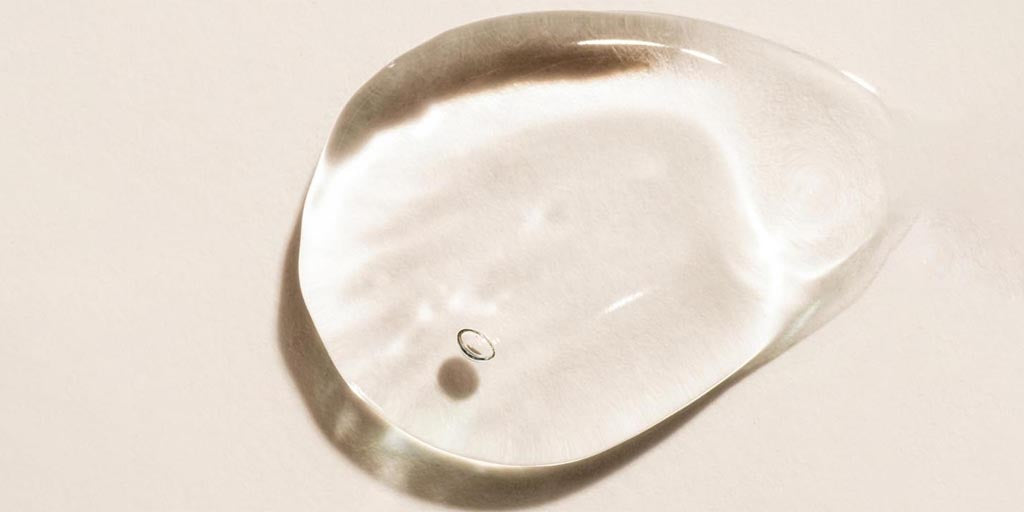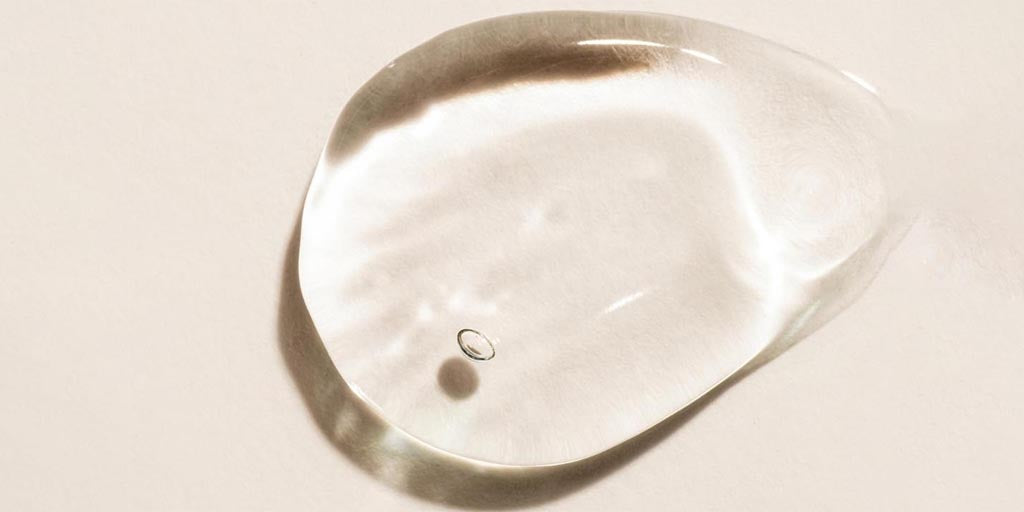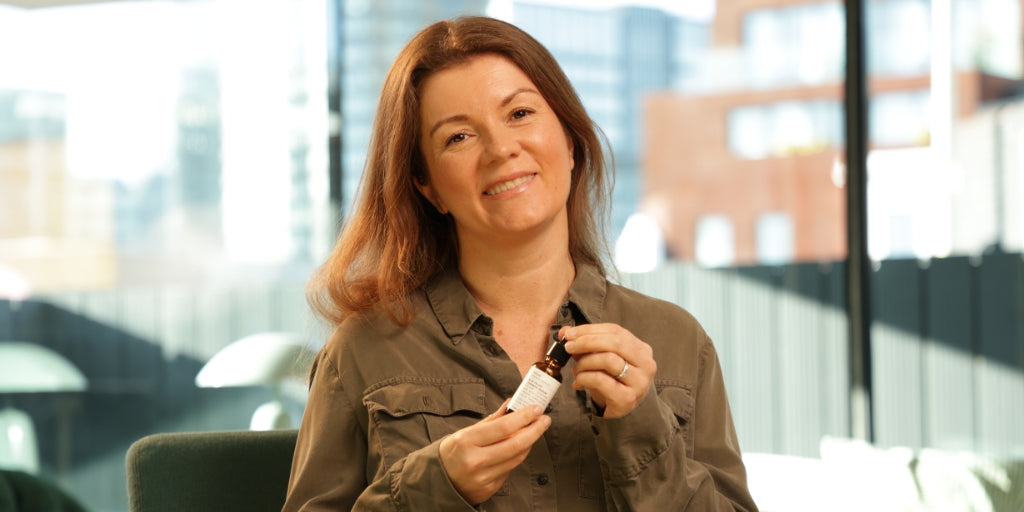If you read or follow anything about skincare, you’ve doubtless heard about Hyaluronic Acid, but you might not be sure how to use it, if it’s right for your skin, or how to fit it into your skincare regime.
Using Hyaluronic Acid topically, as a serum or cream, is scientifically proven to help improve the appearance of fine lines and wrinkles.

In this guide, our founder Laura Rudoe answers all your questions about Hyaluronic Acid and skincare, and shares the best way to benefit from this hydration hero for your skin needs.
This blog will answer the question of "What is Hyaluronic Acid?" amongst many others, and discuss its properties and benefits for the skin. Feel free to skip through to the specific topics below:
What is Hyaluronic Acid?
Where Does Hyaluronic Acid Come From?
What are the Key Benefits of Hyaluronic Acid for Skin?
Hyaluronic Acid – Hydrator, Not Moisturiser
How Does Hyaluronic Acid Work in Skincare?
Which Skin Types Benefit Most from Using Hyaluronic Acid?
Can Oily Skins Use Hyaluronic Acid?
Is Hyaluronic Acid Safe to Use on Sensitive or Eczema Prone Skins?
Will Hyaluronic Acid Help with Skin Dryness?
Is Hyaluronic Acid Effective for Skin Ageing?
Can I Top Up My Hyaluronic Acid Stores with My Diet?
What is Hyaluronic Acid?
You might assume that Hyaluronic Acid is one of the skincare acids, like BHA’s, AHA’s and Glycolic, that exfoliate and increase cell turnover.
But it’s not. While it does leave your skin plumper and looking nicely ‘glowy’, it has quite a different way of doing so.
It’s actually not an ‘acid’ at all. Instead, Hyaluronic Acid is a gel-type sugar-based molecule that can hold a huge amount of water - up to 1000x its own weight to be precise.
It’s a humectant (an ingredient that pulls moisture from the air around it into the skin). This makes it perfect for the job of hydrating the skin’s surface.
Despite the name, Hyaluronic Acid is a very gentle ingredient, which can be used by those with eczema-prone or sensitive skin.
It’s so gentle in fact, that we use it in our Hyaluronic Eye Complex, which targets skin concerns around the delicate eye area. It plumps and smooths out wrinkles, whilst gently hydrating the skin around the eyes, which are one of the area’s most prone to dryness.
“Refreshing, cooling, reviving and activating! I absolutely love using the Hyaluronic Eye complex each morning” Evolve Customer
Our Hyaluronic Eye complex can help to refresh tired eyes
Suitable for all skin types - £18
Where Does Hyaluronic Acid Come From?
One of the things that makes Hyaluronic Acid so effective for skincare, is that it’s naturally synthesised by the body. It can be found in the skin, tendons, and aortic walls.
Around 50% of Hyaluronic Acid that is naturally found in your body is in your skin, where it works to speed up tissue repair by boosting cell metabolism, forming a gelatinous layer around cells.
However, as we age, the amount we store in our bodies decreases - by the age of 50, it’s possible that your body’s Hyaluronic Acid reserves will have decreased by 50%.
This is one of the reasons that our skin tends to become drier and duller as we get older, as new skin cells are not being produced as quickly.
Because of this, we may start to look for external sources of Hyaluronic Acid, to ‘top up’ our natural reserves.
You certainly don’t need to wait until you see the signs of ageing to get started either, it’s great for skin of all ages.
What are the Key Benefits of Hyaluronic Acid on the Skin?
Hydration isn’t the only benefit that this wonder molecule offers.
Hyaluronic Acid can help to protect the skin from UVB radiation, which in turn prevents sunspots, wrinkles, and skin damage. We use two different kinds - low and very low molecular weight.
Whilst low molecular weight is more than sufficient for hydration, very low molecular weight penetrates deeper into the skin’s layers and is more effective for pro-ageing.
It not only forms a protective layer on the skin, but also battles free radicals caused by ultraviolet (UV) light exposure. This means that free radicals don’t get the chance to attack your skin, leaving it calmer, clearer, and with fewer imperfections.
Knowing this led me to create one of my all time favourite products, Daily Defence Moisture Mist.
We designed it to be spritzed on for a dose of protecting ingredients, including Hyaluronic Acid, that leave your skin supported against the outside world, and looking refreshed and glowing.
“Use this in the mornings as a toner. Beautiful. My skin feels soft and so ready for my skincare. Great to set your makeup and ideal to spritz throughout day to refresh makeup” Jackie, Evolve Customer
Leave it in the fridge and it’s the ideal summer hydration hero. It’s also great for helping protect against the effects of pollution, responsible for most signs of premature skin ageing.
Do you want to learn more about your skin, enjoy exclusive savings and have access to new products before anyone else? SIGN UP TODAY
Hyaluronic Acid – Hydrator, Not Moisturiser
Hyaluronic Acid does not add moisture to the skin. Imagine your skin like a sponge. If you fill it full of water, it’ll be plump and squishy. If you leave it to dry out though, it’ll soon return to scratchy and dry.
Hyaluronic Acid basically works like the water in a sponge, plumping and drawing in moisture from the air. It doesn’t ADD moisture to the skin, just hydration. If you stop using it, you’ll stop seeing the benefits.
Hyaluronic Acid helps to lock moisture into the skin and therefore helps the skin be more hydrated.
Moisturisers and oil based serums contain oils that help to repair the skin barrier layer that seals the moisture into the skin and stops it evaporating.
Most people (unless they have very oily skin) need more hydration as well as oil.
Put the water based hydrating serum on first to help it travel deeper into the skin and then apply the oil based serum on top, then the cream to seal in the moisture.

Click to view our Hyaluronic Acid skincare range
How Does Hyaluronic Acid Work in Skincare?
Many Hyaluronic Acid molecules are too big to penetrate the skin’s surface. Firstly, that’s not a bad thing. The acid creates a protective film, improving the appearance of fine lines and wrinkles.
Our organic Hyaluronic Serum 200 is, however, slightly different; the lower molecular weight of the Hyaluronic Acid we use means it can penetrate deeper into the skin, which in turn means that skin is hydrated more efficiently.
It also aids skin’s collagen production, which helps to keep skin elastic and bouncy, and so gives a more youthful look to your appearance.
We use 200mg of Hyaluronic Acid per 30ml bottle!
“Hyaluronic Acid really is a skin saviour for dry skin”. Shona, Evolve Customer
Doctors, dermatologists sometimes use Hyaluronic Acid as a degradable filler, due to how harmoniously it works with the body’s natural functions.
They may add it to cheeks, lips and under the eyes to decrease the signs of ageing, but you don’t need to get injections to reap its benefits.
Just choose a serum that contains Hyaluronic Acid.
Which Skin Types Benefit Most from Using Hyaluronic Acids?
Hyaluronic Acid is safe for use by all skin types.
Can Oily Skins Use Hyaluronic Acid?
Yes. It won’t over-saturate oilier skin because it regulates how much moisture the skin needs, in fact it can reduce over production of oil by re-balancing the skin’s need for hydration.
It also has natural calming properties, so if you suffer from breakouts or redness, it will soothe your skin whilst moisturising it. Our True Balance Gel Cream is designed for oily, breakout-prone skin, and uses Hyaluronic Acid to deliver a dose of non-greasy hydration, whilst the other superstar ingredients work their magic to balance oil production and keep skin calm.
Learn about our skincare for oiler skin here >

Is Hyaluronic Acid Safe to Use on Sensitive or Eczema Prone Skins?
Yes, sensitive skins and those with conditions like Eczema and Rosacea can use Hyaluronic Acid with no concerns about reactivity. In fact, one recent study found that when combined with Proteoglycan and Collagen, it contributes to the restoration of the skin's surface and a reduction in itching and sensitivity.
Learn more about our sensitive skincare here >
Will Hyaluronic Acid Help with Skin Dryness?
Absolutely.
One 2014 study saw participants applying topical Hyaluronic Acid in a number of ways, including as a lotion, serum, and cream. The study results demonstrated an increase of skin hydration of up to 96% after 8 weeks of use across the different types, no matter how it was delivered.
It helps the skin maintain moisture and can even reduce inflammation and soreness by supporting the skin’s natural healing process (reducing skin cracking from dryness), as evidenced in a 2016 study.
Learn more about our skincare for dry and dehydrated skin here >
Is Hyaluronic Acid Effective for Skin Ageing?
When a person ages, they lose elasticity and definition in the skin. The skin becomes less smooth, and the texture becomes rougher, with fine lines becoming more prominent.
Firstly, regular use of a good Hyaluronic Acid serum helps to protect the skin from free radicals and pollution, reducing the early signs of ageing.
Studies also found that Hyaluronic Serum can help reduce the roughness of a person’s skin and increase skin elasticity, effectively turning the clock back. This effect, whilst not permanent, is significant.
Another 2014 study saw participants applying Hyaluronic Acid topically, twice daily, for eight weeks.
They showed a 40% decrease in the depth of wrinkles and an up to 55% increase in skin firmness and elasticity compared with participants who did not apply the acid.
Learn More about how to care for mature skin here >
How to Add Hyaluronic Acid to Your Skincare Routine
It depends on the skincare you’re using.
Moisturisers and serums are two of the most common forms of Hyaluronic Acid.
- Moisturisers: use a moisturiser with Hyaluronic Acid at least twice a day, morning and night, always after cleansing, exfoliating, or applying serums.
- Serums: a Hyaluronic Acid Serum is best used after cleansing. Before you dry, pat a couple of drops into your face with the palms of your hands. Apply a good nourishing moisturiser immediately afterwards to seal in all that hydration.
Hyaluronic Acid works well with most common skin care ingredients, even acid-based ones.
How Often Can You Use Hyaluronic Acid?
I recommend applying Hyaluronic Acid twice a day, morning and night.
When Can You Expect to See Results from Your Hyaluronic Acid?
You can see results immediately from your serum or cream, but they will wear off. As with most types of skincare, the best results are usually seen within four to six weeks of consistent use.
Can I Top Up My Hyaluronic Acid Stores with my Diet?
In a word – yes!
Because Hyaluronic Acid is synthesised by the body, it can be increased by eating certain foods.
There is some evidence that starchy root vegetables might boost production: think potatoes and sweet potatoes, as well as Jerusalem artichokes. These are all also great sources of fibre, potassium, and a variety of vitamins, so it won’t do you any harm to include them in your diet!
If you fancy something a bit more refreshing, reach for a citrus fruit: they contain naringenin, which prevents Hyaluronic Acid from breaking down in the body. Fruits containing high levels of naringenin include oranges, bananas, grapefruits, and tomatoes - so pick a favourite to snack on.
Your skin will be glowing and supple in no time!
Lastly, unsurprisingly, leafy greens make the list. They contain magnesium, which aids the body’s Hyaluronic Acid production.
Get sipping on a spinach-filled smoothie or add some kale crisps to your lunchbox. Alternatively, avocados are also high in magnesium, as are certain nuts, fruits, and seeds.
Still not sure if Hyaluronic Acid is the right option for your skin? Book a FREE consultation with our skin experts now






